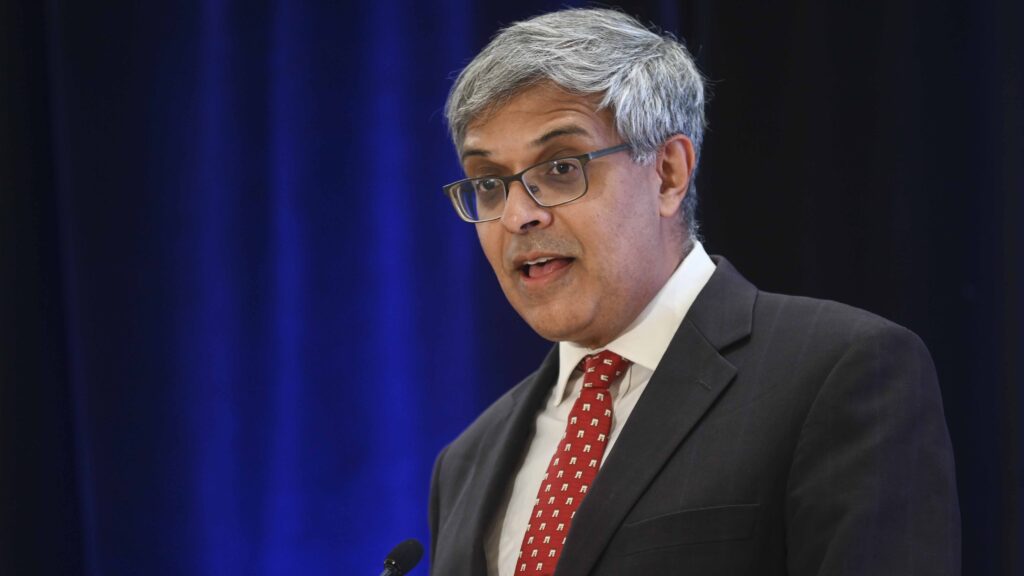President-elect Trump has chosen Stanford University professor Jay Bhattacharya to lead the National Institutes of Health, his transition announced Tuesday.
If confirmed by the Senate, Bhattacharya would be in charge of implementing the incoming Trump administration’s bold goals to reform the agency. Support for the NIH before the Covid-19 pandemic used to be a rare point of common ground for Democrats and Republicans, and the agency got budget increases year after year. But a more combative era is here.
advertisement
Robert F. Kennedy Jr., Trump’s pick for Health and Human Services secretary, has suggested he wants to replace hundreds of NIH employees the day Trump takes office. RFK Jr. has also said he wants to shift the agency’s attention from infectious disease toward chronic disease.
“Together, Jay and RFK Jr. will restore the NIH to a Gold Standard of Medical Research as they examine the underlying causes of, and solutions to, America’s biggest Health challenges, including our Crisis of Chronic Illness and Disease,” Trump said in a statement announcing his selection.
The NIH has 27 institutes and centers, including ones focused on cancer, aging, and diabetes.
advertisement
NIH director is the last major health position to be filled in the second Trump administration. Trump picked Mehmet Oz to lead the Centers for Medicare and Medicaid Services, Martin Makary to lead the Food and Drug Administration, David Weldon to head the Centers for Disease Control and Prevention, and Janette Nesheiwat to be Surgeon General. On Tuesday, Trump also selected Jim O’Neill as the deputy secretary at HHS.
Bhattacharya has spent almost his entire career at Stanford University. He is currently listed as a professor of health policy. He received four degrees, including a medical degree and Ph.D. in economics, from Stanford, too.
The National Institutes of Health is a nearly $48 billion agency that invests much of its resources in funding tens of thousands of research grants. But some of Bhattacharya’s own medical research has stirred controversy in the medical community.
In April 2020, Bhattacharya published a preprint of a study he authored on the seroprevalence of Covid-19 to measure how many people had been infected with the virus. The study showed that many people who had been infected with Covid-19 did not recall symptoms, and that death rates were lower than initially expected. The study prompted controversy within the scientific community.
Bhattacharya gained an even higher profile after co-authoring an open letter, the Great Barrington Declaration, which opposed broad lockdowns and advanced the theory that the U.S. could achieve herd immunity to Covid-19 even before a vaccine was available.
Besides his work on Covid-19, Bhattacharya filed a patent for a flexible spending account calculator and has published research on health economics, including the costs of HIV care, insurance markets, and how technology could impact health costs.
According to his curriculum vitae, Bhattacharya finished his medical degree in 1997 and then went straight into a career in academia. He was an economist at the RAND Corporation and a visiting assistant professor at the University of California, Los Angeles from 1998 until 2001, when he started teaching at Stanford. He did not complete a residency and is not a practicing physician.
advertisement
Bhattacharya joined a lawsuit that went to the Supreme Court arguing that the federal government censored users via social media platforms for their views on Covid-19. The Supreme Court in a 6-3 decision ruled in favor of the platforms, saying that the plaintiffs didn’t prove a causal link between government policies and the platforms’ content moderation policies.
In Dec. 2022, Bhattacharya visited Elon Musk at the company headquarters for the platform then called Twitter to discuss why he was placed on a blacklist for his posts about Covid-19 lockdowns. Trump appointed Musk to head of the so-called Department of Government Efficiency.
Following a Washington Post report that he was being considered for the director of NIH, Bhattacharya posted on the social platform X: “No matter what happens, I will do my best in the coming years, in whatever role I have, to help support the reform of the American scientific and public health institutions after the covid era fiasco so that they work for the benefit of the American people.”
Republican lawmakers have called for reforms to the agency, including Sen. Bill Cassidy (R-La.), who is in line to chair the Senate’s health committee next year. They have also criticized the agency’s investments in so-called “gain-of-function” research.
“I am interested in how Dr. Bhattacharya sees using his background as a health economist to guide the NIH,” Cassidy said in a post on X. “I look forward to our meeting.”

